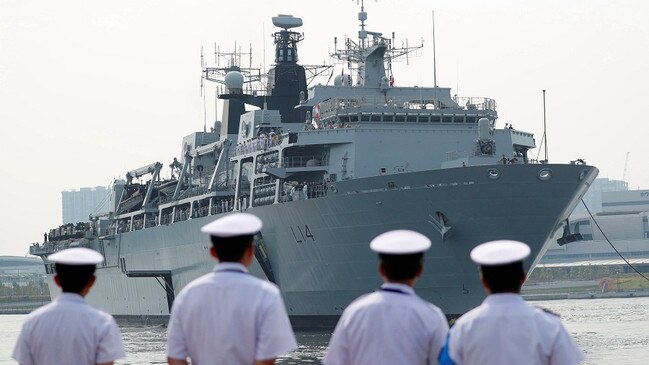China fury at UK sail past of disputed isles
China has protested against Britain’s sending a warship past the disputed Paracel Islands, in the South China Sea.

China has protested against Britain’s sending a warship past the disputed Paracel Islands, in the South China Sea, calling it a “provocative action”.
“The action taken by the British ship violated Chinese law and international law and infringed on China’s sovereignty,” Foreign Ministry Hua Chunying said.
The comments on Thursday were made after Britain’s HMS Albion passed the Paracel Islands, south of China’s Hainan Island and east of Vietnam, a week ago en route from Tokyo to Vietnam.
China claims the islands, which it calls the Xisha. Vietnam and Taiwan also claim them.
The move by Britain is seen as a sign of its new willingness to show military interest in the South China Sea.
Although the US has conducted freedom-of-navigation exercises in the South China Sea, the Albion’s voyage shows a new British interest in the area. This was signalled in a visit to Australia in February this year by British Defence Secretary Gavin Williamson, who said he expected to see a more active British presence in the region including possible freedom-of-navigation exercises.
China claimed the Albion “illegally entered” its territorial waters. It is believed the amphibious assault ship did not sail within the 12-nautical-mile zone but sailed close enough to be seen as a challenge, which prompted the Chinese navy to order it to leave the area.
“HMS Albion exercised her rights of freedom of navigation in full compliance with international law and norms,” a spokesman for the Royal Navy said yesterday.
The incident follows a close encounter between an Australian navy ship and the Chinese navy in April in the Spratlys, another contested area in the South China Sea.
Australia has a policy of not conducting freedom-of-navigation exercises. US navy ships have patrolled near the artificial islands China has created in the Spratly archipelago to underscore Washington’s position that they are located in international waters.
Ms Hua said China had urged Britain to stop its provocation “lest it undermine the overall picture of bilateral ties as well as regional peace and stability”.
Lowy Institute senior fellow Euan Graham told The Weekend Australian the RN’s sail past, and China’s very public reaction to it, had “reawakened the issue” of freedom-of-navigation operations in the South China Sea.
Dr Graham said the British freedom-of-navigation exercise was a “good thing, for demonstrating that freedom of navigation is an international interest, supported by more than the US”.
“Whether this will be sustained depends on the UK’s political will and fiscal ability to fund a consistent defence presence in the Indo-Pacific,” he said.
“The proof of that can only come in time, and is contingent on post-Brexit developments.
“The fact that it has generated this much publicity makes me wonder whether the UK defence minister’s very public promise, made several months back, in Sydney, that a British ship would uphold freedom of navigation in the South China Sea demanded, in turn, that Albion’s transit near the Paracels would receive a lot of media publicity.”
He said the Royal Australian Navy had a more “business-as- usual” modus operandi in the South China Sea. Australia’s strategic focus at the moment was in the South Pacific.
However, he said the British sail past was “interesting timing” for Australia, with new Defence Minister Marise Payne, new Chief of Defence Force Angus Campbell and Chief of Navy Vice Admiral Michael Noonan.
“The broad contours of (Australia’s) strategic policy won’t change. But the new line-up may be prepared to be more vocal and concerted in how they go about Australia’s strategic ‘business’, including in the South China Sea.”
Dr Graham said no one expected freedom-of-navigation operations would prompt change in China’s behaviour. “It’s more about ‘counter-coercion’: demonstrating to China — and each other — that we aren’t deterred from operating where international law allows, or that we customarily accept China’s excessive claims,” he said.



